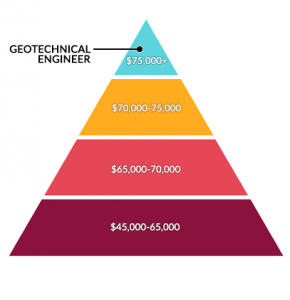Indicators on Geotheta You Should Know
Indicators on Geotheta You Should Know
Blog Article
The Buzz on Geotheta
Table of ContentsThe 3-Minute Rule for GeothetaGeotheta Fundamentals ExplainedSome Ideas on Geotheta You Should KnowGeotheta Things To Know Before You BuyNot known Details About Geotheta

They conduct site investigations, collect examples, carry out research laboratory examinations, and evaluate data to evaluate the suitability of the ground for building and construction projects - Engineer of Record. Based upon their searchings for, geotechnical designers give suggestions for foundation style, slope security, preserving structures, and reduction of geotechnical risks. They work together with other experts, such as designers, structural designers, and building teams, to make certain that geotechnical factors to consider are integrated into the general task style and execution
By examining the behavior and homes of soil and rock, they can recognize prospective geotechnical threats such as landslides, dirt negotiation, or incline instability. Their expertise aids avoid failures or mishaps that might jeopardize lives and property. Here are some in-depth obligations and duties of a geotechnical engineer: Site Examination: Geotechnical engineers conduct website investigations to gather data on subsurface conditions.
They interpret the information to understand the residential properties and habits of the soil and rock, including their strength, permeability, compaction features, and groundwater conditions. Geotechnical Analysis and Design: Geotechnical engineers analyze the information collected throughout website examinations to assess the security and suitability of the site for building projects. They carry out geotechnical computations and modeling to evaluate factors such as bearing capacity, negotiation, incline stability, side planet stress, and groundwater flow.
The Basic Principles Of Geotheta
Structure Style: Geotechnical engineers play an important function in creating structures that can safely sustain the intended framework. They evaluate the dirt problems and tons requirements to identify the ideal foundation kind, such as superficial foundations (e.g., grounds), deep foundations (e.g (https://www.cheaperseeker.com/u/geotheta)., stacks), or specialized methods like soil enhancement. They consider aspects such as settlement limits, bearing capacity, and soil-structure communication to establish ideal foundation styles
They assess building and construction plans, monitor website tasks, and perform field evaluations to verify that the design recommendations are adhered to. If unanticipated geotechnical concerns occur, they assess the situation and give referrals for removal or modifications to the design. Risk Evaluation and Mitigation: Geotechnical designers evaluate geotechnical threats and dangers related to the project website, such as landslides, liquefaction, or soil disintegration.

Partnership and Communication: Geotechnical engineers work very closely with other specialists involved in a task, such as designers, structural designers, and building groups. Efficient communication and partnership are necessary to integrate geotechnical factors to consider into the total project style and building procedure. Geotechnical engineers supply technological knowledge, solution questions, and guarantee that geotechnical needs are met.
8 Easy Facts About Geotheta Explained
Below are some sorts of geotechnical designers: Foundation Designer: Structure designers concentrate on designing and evaluating structures for structures. They analyze the soil problems, load needs, and site features to establish the most suitable structure type and style, such as superficial foundations, deep structures, or specialized techniques like pile structures.
They review the variables influencing slope stability, such as dirt buildings, groundwater conditions, and incline geometry, and create techniques to stop slope failures and reduce threats. Earthquake Engineer: Quake designers focus on examining and making frameworks to stand up to seismic pressures. They analyze the seismic risk of a site, evaluate dirt liquefaction possibility, and establish seismic layout standards to guarantee the safety and resilience of frameworks during earthquakes.
They perform field testing, collect samples, and assess the accumulated information to define the soil residential properties, geologic developments, and groundwater conditions at a site. Geotechnical Instrumentation Engineer: Geotechnical instrumentation engineers concentrate on tracking and determining the actions of Recommended Reading dirt, rock, and frameworks. They set up and keep instrumentation systems that keep an eye on elements such as soil negotiation, groundwater degrees, incline activities, and structural displacements to assess performance and supply very early cautions of potential issues.
Indicators on Geotheta You Should Know
They conduct examinations such as triaxial tests, combination tests, straight shear tests, and permeability tests to collect data for geotechnical evaluation and design. Geosynthetics Engineer: Geosynthetics designers concentrate on the style and application of geosynthetic products, such as geotextiles, geogrids, and geomembranes. They use these products to enhance dirt security, strengthen slopes, give water drainage solutions, and control erosion.
They often tend to be investigative individuals, which implies they're intellectual, reflective, and investigative. They are interested, methodical, logical, analytical, and logical. Some of them are also social, meaning they're kind, generous, cooperative, person, caring, useful, understanding, skillful, and friendly - Consulting Engineers.
In the office atmosphere, geotechnical designers make use of specialized software application tools to execute computations, produce layouts, and evaluate information. They prepare reports, testimonial project specs, connect with clients and team members, and coordinate job tasks. The office setup provides a favorable environment for research, evaluation, and collaboration with other professionals involved in the task.
The 7-Second Trick For Geotheta
They regularly see job websites to perform website investigations, analyze geotechnical conditions, and gather information for analysis. These check outs include traveling to various locations, sometimes in remote or tough surfaces. Geotechnical engineers may perform dirt sampling, conduct tests, and display building activities to make certain that the geotechnical aspects of the job are being executed correctly.
Geotechnical designers additionally operate in specialized geotechnical research laboratories. In these facilities, they carry out experiments, do examinations on dirt and rock samples, and analyze the engineering properties of the products. Geotechnical research laboratory designers work thoroughly in these environments, dealing with screening devices, operating tools, and taping information. They team up with other lab team to ensure precise and reputable screening results.
Report this page